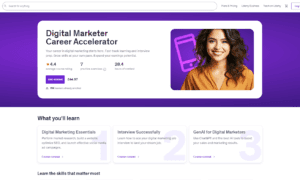Content marketing is a strategic approach to creating and distributing valuable, relevant, and consistent content to attract and retain a defined audience. In an era where digital presence dictates business success, content marketing has emerged as a cornerstone of effective business strategy. By leveraging content marketing services, businesses can position themselves as thought leaders within their industry, build credibility, and drive meaningful engagement with their target audience.
The Essence of Content Marketing
At its core, content marketing revolves around storytelling. It’s about crafting narratives that resonate with your audience, providing them with value, and guiding them through the various stages of the buying journey. Unlike traditional advertising, which often focuses on immediate sales, content marketing emphasizes building relationships and trust over time.
Key Objectives of Content Marketing:
1) Attracting a Defined Audience: Through tailored content, businesses can draw in individuals who are most likely to benefit from their products or services.
2) Engagement and Retention: Consistent, high-quality content keeps the audience engaged and encourages them to return for more.
3) Thought Leadership: By sharing insights and knowledge, businesses can establish themselves as authorities in their field.
The Pillars of Content Marketing Services
Content marketing services encompass a broad range of activities, each crucial for developing and executing a successful content strategy. These services can be categorized into three main areas: content creation, content distribution, and content promotion.
1. Content Creation
Creating compelling content is the foundation of any content marketing strategy. This involves not only producing high-quality materials but also ensuring that the content aligns with the audience’s needs and interests.
- Blog Posts and Articles: These are staples of content marketing, providing detailed information on relevant topics. Well-researched blog posts can improve SEO and drive organic traffic.
- Infographics: Visual content like infographics can make complex information easily digestible and shareable.
- Videos: With the rise of video consumption, creating engaging videos can significantly boost audience engagement.
- E-books and Whitepapers: These in-depth resources can establish a company as an expert in its field and are often used in lead generation campaigns.
- Case Studies and Testimonials: Showcasing real-life success stories can build trust and credibility.
2. Content Distribution
Creating great content is just the first step. Effective distribution ensures that the content reaches the intended audience through the right channels.
- Social Media: Platforms like Facebook, LinkedIn, Twitter, and Instagram are essential for sharing content and engaging with the audience.
- Email Marketing: Regular newsletters and targeted email campaigns can keep the audience informed and engaged.
- SEO and SEM: Optimizing content for search engines and using paid search campaigns can increase visibility and drive traffic.
- Content Syndication: Repurposing and sharing content across various platforms can amplify its reach.
3. Content Promotion
Promotion involves actively pushing content to ensure it gets the attention it deserves. This can be achieved through several methods:
- Influencer Marketing: Collaborating with influencers can help reach a broader audience.
- Paid Advertising: Using paid channels such as Google Ads, social media ads, and sponsored content can drive targeted traffic.
- Public Relations: Leveraging media outlets and industry publications can enhance content visibility.
Customizing Content for Target Audiences
One of the significant advantages of content marketing services is the ability to tailor messaging and content to resonate with specific target audiences. This customization is achieved through a deep understanding of the audience’s demographics, behaviors, and preferences.
Steps to Tailoring Content:
- Audience Research: Understanding who the target audience is, what their needs are, and how they consume content.
- Persona Development: Creating detailed buyer personas to guide content creation.
- Content Mapping: Aligning content with the different stages of the buyer’s journey – awareness, consideration, and decision.
- Personalization: Using data and insights to personalize content for individual audience segments.
Measuring and Analyzing Content Effectiveness
A crucial aspect of content marketing is the ability to measure and analyze the performance of content to inform future strategies. This involves tracking various metrics and using analytics tools to gain insights.
Key Metrics to Track:
- Traffic: Monitoring the number of visitors to the website.
- Engagement: Measuring likes, shares, comments, and time spent on content.
- Conversions: Tracking how many visitors take desired actions, such as filling out a form or making a purchase.
- ROI: Calculating the return on investment for content marketing efforts.
Benefits of Implementing Content Marketing Services
Businesses that invest in content marketing services can experience a multitude of benefits, ranging from increased website traffic to enhanced brand awareness and customer engagement.
Major Benefits:
- Increased Website Traffic: Quality content can drive more organic traffic to the website.
- Enhanced Brand Awareness: Consistent content helps in building brand recognition and awareness.
- Improved Customer Engagement: Engaging content fosters a deeper connection with the audience.
- Lead Generation: Valuable content can attract and convert leads.
- Customer Retention: Providing ongoing value helps in retaining customers and building loyalty.
- Thought Leadership: Establishing the business as an authority in its field.
- Cost-Effective Marketing: Content marketing is often more cost-effective than traditional advertising methods.
Nurturing Customer Relationships
Content marketing is not just about attracting new customers but also about nurturing relationships with potential and existing customers. By providing valuable information and resources, businesses can support customers throughout their buying journey.
Strategies for Nurturing Relationships:
- Educational Content: Offering tutorials, how-to guides, and educational articles to help customers make informed decisions.
- Interactive Content: Engaging customers with quizzes, polls, and interactive tools.
- Customer Support Content: Providing FAQs, troubleshooting guides, and customer stories to address common issues.
- Regular Updates: Keeping customers informed with the latest news, updates, and product information.
Establishing Trust and Credibility
Consistently delivering high-quality content allows businesses to establish themselves as trusted sources of information within their industry. Trust and credibility are crucial for building long-term customer relationships.
Ways to Build Trust:
- Transparency: Being open and honest in all communications.
- Expertise: Demonstrating deep knowledge and expertise through content.
- Consistency: Maintaining a consistent tone, style, and quality across all content.
- Authenticity: Being genuine and relatable in content creation.
Accessibility for All Business Sizes
One of the strengths of content marketing services is their adaptability to different budgets and business objectives. Whether a small startup or a large corporation, content marketing can be tailored to meet specific needs and financial constraints.
Scalable Solutions:
- Budget-Friendly Options: Utilizing cost-effective methods like social media and blogging.
- Premium Services: Investing in high-quality video production, influencer partnerships, and advanced analytics.
- Flexible Strategies: Adapting strategies based on performance and feedback.
Staying Competitive in a Digital Landscape
In today’s rapidly evolving digital landscape, staying competitive requires continuous adaptation and innovation. Investing in effective content marketing services is crucial for businesses to remain relevant and ahead of the competition.
Key Strategies for Competitiveness:
- Embracing New Technologies: Leveraging AI, automation, and advanced analytics for smarter content strategies.
- Keeping Up with Trends: Staying informed about the latest industry trends and adapting content accordingly.
- Engaging with Emerging Platforms: Exploring new platforms and channels to reach wider audiences.
- Fostering a Culture of Innovation: Encouraging creativity and experimentation in content creation.
Conclusion
Content marketing services play a pivotal role in modern business strategies. By focusing on creating and distributing valuable, relevant, and consistent content, businesses can attract and retain a defined audience, establish themselves as thought leaders, and build lasting relationships with their customers. The strategic implementation of content creation, distribution, and promotion, coupled with continuous measurement and analysis, can drive significant benefits, including increased website traffic, brand awareness, customer engagement, and lead generation.
In an ever-evolving digital landscape, the importance of effective content marketing cannot be overstated. It provides businesses of all sizes with the tools and strategies necessary to stay competitive, relevant, and successful. Whether you are a small startup or a large enterprise, investing in content marketing services is a crucial step towards achieving long-term growth and success.



































